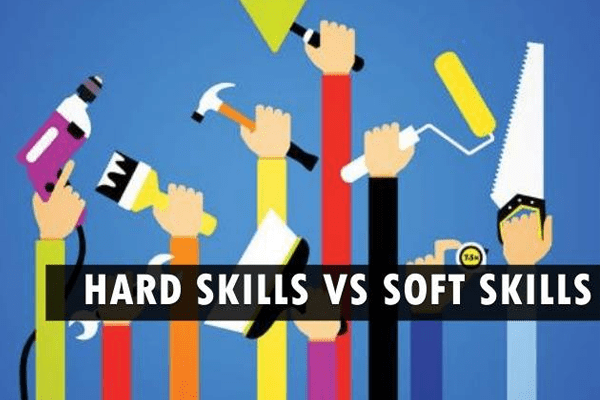UNDERSTANDING HARD SKILLS AND SOFT SKILLS, RESEARCH OUTCOMES,IMPORTANCE,
Well-dressed, well-mannered, confident, impressive responses, certificates of achievements usually leads the hiring professional to decide hiring the candidate possessing the traits. However, the question arises why most of them fail in few months of hiring even after great performance in interview. Is it because of the available online best answers for interviews or lack of proper balance of possessing and developing skills; both hard and soft skills?
Skills are the most important components of human life that helps us to build our identity, enables us to achieve our dreams, and induces us to work for our living. It is very important to have blend of proper skills to be successful in desired career. There are varieties of career opportunity in different sector and the skills required also varies. Decades earlier, the importance was limited to hard core skills with money being the only motivation factor. Now, time, place, working methods, standards, strategies, style and culture have changed and so has the perception of skills. Now, one needs to focus in understanding Hard skills and Soft skills and know to balance these skills in their respective workplace.

Understanding Hard Skills and Soft Skills
The trend of understanding Hard skills and Soft skills is increasing day by day with its growing necessity to improve one’s career and establish oneself in their respective field. This has become essential especially after most of them have found themselves ending up having difficulty in working with the same most appropriate candidate they selected in the interview. Let’s first focus in understanding what these popular skills actually mean.
Hard Skills
Tangible skills that are required and essential to perform a particular job are hard skills and one has to have proper learned knowledge, training, experience, abilities related to the profession. One can excel in hard skill after having proper level of competency. Technical, administrative, mechanical, accounting, statistics, data analysis skills are examples of hard skills which require knowledge of writing, operating a machine, computers, speaking a foreign language, typing etc. These skills are easily identified and you can show or prove your credentials, know-how in form of school, college, university degrees, and training certificates. These skills are the first requirement for recruiter to recognize you as potential candidate for the required job or level of employment.
Soft Skills
Soft skills has now popularly becoming a must in almost everything you do today. These skills are essentially people skills, personal attributes which can be observed in your efforts and work but is difficult to measure. Thus, these skills are intangible but necessary. Today, the work environment requires team work, networking, time-management, problem solving, decision-making, critical thinking and most importantly proper communication every time, everywhere with co-workers, clients, customers, and creditors. These skills have ethical and professional values. Thus, just possession of required knowledge or hard skills is not enough if you are not able to work on well with your team, superiors or other stakeholders.
Understanding hard skills and soft skills is not just on the basis of mere definitions and it cannot be understood just by listening or reading. You have to practice these skills to strike a proper balance of them in your workplace.

Research Outcomes and Viewpoints
Understanding hard skills and Soft skills has been the topic of debate and interest from many years.
The Carnegie foundation and Stanford Research Center came up with a conclusion in the research conducted by Harvard University, that well-developed and effective soft and people skills leads to 85% of job success, and only 15% of job success results from technical and hard skills.
Adecco Staffing USA conducted a survey and came up with results that 44 % of executives agreed and stated that the biggest gap of proficiency they have seen in U.S. workforce is due to lack of soft skills.
Instructure, which is a software-as-a-service company, conducted a research and stated that recruiters believe that an entry level employee can succeed more at work through soft skills than the skills they have learned in school. This shows that recruiters select candidates based on their hard skills and try to focus on training them to develop needed soft skills to excel and succeed in workplace.
International Association of Administrative Professionals, HR.com and Office Team submitted a report that 67% of Hiring and HR managers have stated that they would hire candidates with strong and efficient soft skills with less hard skills and 9% of them opined to hire strong technically appropriate candidates.
CareerBuilder states that, 77% of HR professionals and Hiring managers made a survey in 2014 and has claimed that soft skills are as important as hard skills. On behalf of Career Builder, Harris Poll had conducted the survey online within U.S among 2138 HR professionals and hiring managers. According to the survey, the top ten soft skills companies look for when hiring are candidates having strong work ethic, who is dependable , has a positive attitude, is self-motivated, is team-oriented, is organized, can manage multiple priorities, works well under pressure, is an effective communicator, is flexible and is confident.
Edward D. Hess, who is a professor of business administration at the University of Virginia’s Darden School of Business opined “We want people who can continuously learn with others in teams. That gets into all the soft skills. If your advantage is going to be outthinking competitors and dealing with customers, you’ve got to have soft skills.”
iSixSigma Magazine came up with research idea of asking Six Sigma practitioners all around the world with a question put forward that as a black belt successors, what are the skills they think or thought are or were very important for their success?
Of course, the expected answer was the technical aspect. However, the top five skills as quoted by respondents were Communication Skill, Leadership skill, Interpersonal skill, Technical skill and Analytical skill. According to the one of the practitioner, excellent instructions, passion and practice can easily help one learn the technical aspect. Thus the soft skills resulted as top three critical success factor with agreement of 65% of respondents.
LinkedIn has also conducted research making analysis on the listed soft skills of the members in their profiles who have made changes in their employment between one year of June 2014 and 15. You can see the story: Soft Skills Matter: Can They Be Taught?. The research concluded that the soft skills that are in most demand out of total 58 skills are effective communication, well-organization, team work, punctuality, critical thinking, social, creative thinking, interpersonal communication, easily adaptable and friendly personality.
The researches still continues on the debate of Hard skill vs. Soft skill. But the answer is both are equally important. What matters is the role you are playing in the organization.
Importance
Both the skills are equally important but can however vary depending upon the careers you choose.
- Careers with need of more hard skills: Some careers like Physicist, Chemist, Technician, Scientists consists of people making maximum use of their talent and can work on their own with their own ideas, logics and working methodologies coming up with genius outcomes of their research. They may require little people skills but their success depends entirely upon their mastermind.
- Careers needing both hard and soft skills: Most of the careers especially businesspersons, designers, lawyers, accountants, administrators etc need to have knowledge, skills and abilities of their profession and at the same time need to sell their ability in front of clients and customers to be successful in their career. Their task is not limited to just sit in their desk, go through and work on the number of files and papers and finally leave the office. Now, the work place is extremely competitive and you have to prove and show your KSA(Knowledge, Skills and Abilities) in order to retain or reach to a particular level and this is possible through people skills; soft skills.
- Careers needing little hard skills and most of soft skills: Some careers of marketing and sales of both products and services need to excel in soft skills like interpersonal, communication, networking and persuasion/convincing skills. One has to identify, understand the customer’s needs, strike right on the need, display appropriate emotions, give examples of related services and better outcomes, get to establish a proper relationship and of course able to close the deal appropriately. For this, one can have little knowledge but need to display more of soft skills.
As per the analysis of LinkedIn, the industries where these soft skills are of most value are professional training, consumer services, restaurants, retail, sports, Hospitality, Human resources, Facilities services, Civil and Social organizations and management consulting. Similarly, some industries where hard skills are more important are Graphic Design, Motion Pictures and film, Architecture and planning, Music, Photography, Fine art, Design, Civil engineering, Law practice and Arts and Crafts.
Let’s take an example of an IT training institute. You visit the institute as a student with interest to learn a particular course. There, you meet the counselor who can either be the appointed ones or the owner, manager themselves. S/he approaches you, listens to you and your needs carefully, understands your need, gives you details of the course, instructor, tries to make some friendly association yet maintaining professionalism. S/he focuses his/her energy to convince you for taking the training from the institute itself without letting you feel so. Comes up with alternatives and suggestions when s/he sees you confused or stressed making you feeling relieved. You get impressed by their talks, their personality, their ability to put forward their ideas, their interest in listening to you, your views, your needs, their knowledge in IT and decide to take the training even if the course fee varies from other similar institutes.
You end up studying well as the person personally meets you in class, takes feedback if everything is going well, communicates with you regarding the training progress, helps you to receive more training materials, and make environment more comfortable. S/he may also be able to convince you to study related courses and help you end up with internship or a job in clients’ network. S/he may call you occasionally to share your experience in the institute with other students. You are satisfied, happy and refer others to learn from the same institute. But you may never know that the manager, counselor, owner may not be even an IT graduate or have little knowledge in the course you have learned. The managerial, communicating, interpersonal skills helps one to lead the industry or organization. Still having some knowledge of IT is important with proper understanding of course and details to enable one to strongly prove his/her point.
Thus, Understanding Hard and soft skills is very important and both the skills play different yet significant roles within your career. Hard skills helps you to be prepared for your job and gets you to the interview while soft skills enables and supports you to advance in your job.

Emphasize and find the Right balance
At the time of job application, you should entirely focus and be sure to put emphasis on both hard and soft skills. For that, you need to stress on identifying and understanding your hard and soft skills. During the job application process, you should therefore be sure to emphasize both your hard and soft skills and find out the need of these skills in the job you are seeking. For example, if you seek to apply for a project manager, your resume should include hard skills like knowledge of PM methodologies like Agile or Waterfall, certifications in training like PMP, business analysis knowledge, software knowledge of Project management tools, Workflow Management Software, Gantt Chart Software etc. At the same time, you need to possess important people skills like communication, decision-making abilities, problem solving skills and yes, be prepared to answer real examples based on experience and demonstrate them after you are hired, Of course, everyone are not experienced enough. We need to start a job to get experience. Soft skills are skills that are learnt in progress. You just need to learn and practice it right from the school level demonstrating and developing these abilities step by step.
In hiring, HR manager need to define the appropriate balance between hard and soft skill abilities of the candidate. But how? There is no straight, simple and universal answer to this .However, one can think and evaluate individual situations and come up with workable solutions. Give proper weight to all the hard and soft skills factors needed for the job to the candidate. It’s important to remember that same formula does not apply for all. Some difficult positions may require to see hard skills first but the managers need to see and be prepared to fulfill the soft skill gap as they move ahead in work.
One has to see how the candidate or the fresh hire utilize their IQ and EQ in their workplace. She/he needs to drive their attention in understanding Hard and Soft skills required in job and in candidate.
As per the publication in Society for Human Resource Management, The HR department of The Peters Corporation., a Santa Fe company with businesses in industries like hospitality and commercial real estate uses a series of questions to get to know how candidates look at their work, behave and collaborate toward others in the office. Some of the questions are:
- What is an example of a time when you worked on a project with more than one other person?
- What was the project’s goal?
- How did the team allocate the work?
- Who decided what was going to be accomplished and who was going to do it?
- What was the outcome? Did you succeed? If not, what were the challenges?
- How well did you work with the team?
- What do you think a successful team looks like?

One just need to think properly and know what exactly you are looking for in a candidate and also know that you can’t just get everything you want. Some can also be developed by you with time in workplace. You need to identify those lacks and manage them after the candidate is hired. You need to be a good coach and yes, take out time for it. One has to help candidates manage their approach of work. For proper development of soft skills after utilization of hard skills, HR managers need to make employee development plans and work together to mentor them in working, communicating, listening and team-working. Simply put forward as Document, measure, monitor and mentor.
Thus, we need to remember understanding hard and soft skills of your own and the desired job is what matters the most and is the first step towards your career.
Recent News
-

Duane Chapman Is Now Engaged To Girlfriend Francie Frane, Had Lost Wife 10 Months Earlier
-

Katherine Schwarzenegger Pregnant With Her First Child With Husband Chris Pratt
-

Chris Cuomo's Son Mario Tested Postive For Coronavirus
-

Kodak Black And NBA YoungBoy, Dissing One Another Via Social Media
-

Maeve Kennedy McKean, Robert F. Kennedy's Granddaughter, is Missing Along With Her Son
Entertainment
-

The Evolution of Entertainment: Online Casting Calls Redefining the Industry
-

Mamoudou Athie's Must-Watch Performances in the Movies and TV Series
-

Try These Unique Forms of Entertainment When You've Exhausted All Options
-

7 Best Movies on Netflix This Week
-

Campus Grooves: Exploring Music Festivals in American Colleges




